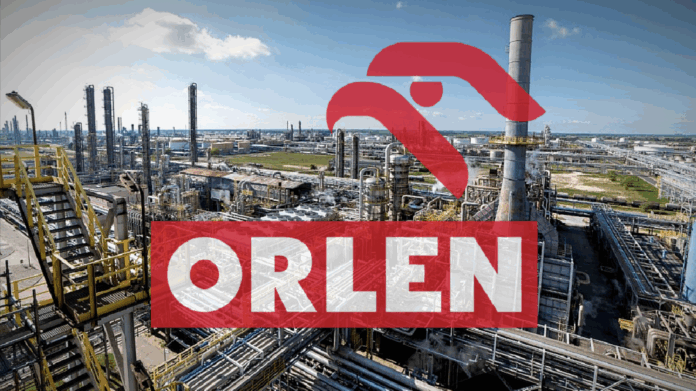Polish energy giant Orlen is partnering with Microsoft on central Europe’s largest AI rollout, spanning cybersecurity, operations, and workforce efficiency, anchored by a new AI centre for experimentation and training.
In sum – what to know:
Microsoft collaboration – Orlen’s work with the US cloud giant covers Copilot licences, cloud services, and a staff training hub for real-world AI applications.
Digital transformation – the initiative supports Orlen’s $105bn digital change plan, targeting energy security and operational efficiency across 200+ ‘companies’.
5G/AI integration – the new project builds on earlier Industry 4.0 efforts, including private 5G trials with Siemens for industrial automation and cybersecurity.
Polish multinational oil and gas firm Orlen is working with Microsoft on the “largest AI implementation in central Europe”. The scope of work covers cybersecurity, production processes, data analysis, and staff efficiency. The arrangement with Microsoft, which has not been publicly valued, covers software licences (for Microsoft Copilot, for starters), joint workshops, and a new AI centre for training staff and developing projects. The latter will establish the AI centre as an ‘ incubator’ for AI experimentation and implementation, focused on “real business value”.
Orlen, headquartered in Płock in the middle of Poland, is the largest company in central and eastern Europe, listed on the Warsaw Stock Exchange, and ranked on Fortune Global 500, and elsewhere. The group consists of more than 200 “companies” located in more than a dozen countries. Its operations cover oil refinery, petrol retail, and natural gas trading, all across the region; its subsidiaries include Unipetrol in the Czech Republic (Czechia) and Orlen Lietuva in Lithuania. Its largest shareholder is the Polish state, with 49.9 percent of the shares.
The firm claims about PLN 295 billion (about $81bn) in annual revenue, and has around 60,000 staff. Its new 2035 digital transformation plan, announced in January, seeks to put “digital tools and data management” at the heart of a strategy to “ensure energy security throughout the region and [the supply of]… cheap energy to Poles”, it said. The project is billed by the firm as the “largest investment programme in the history of the Polish energy sector”. It is said to be worth up to PLN 380 billion ($105bn) across its lifetime.

Ireneusz Fąfara, chief executive at the company, said: “Energy transformation is a challenge for the entire economy, which requires concrete action now… Today, this sector has become one big construction site. We want to accelerate even further, which is why we are reaching for tools available on the market to support our daily work… Effective management of such a structure requires constant exchange of information, [and] introduction of new solutions that allow us to maintain competitiveness and achieve business goals even better.”
He added: “Implementing AI solutions throughout the organization… will increase the efficiency of our daily operations, relieving employees of simple, repetitive duties, allowing us to make much better use of their unique competencies. They are our most valuable resource.” The agreement with Microsoft aims to “standardize and consolidate” software licenses across the group, “secure and develop” cloud technologies, and introduce “intelligent assistants” to “relieve employees of daily repetitive tasks [and make] recommendations based on analyzed data”.
Generative and agentic AI technologies are part of its ‘incubation’ plan at the new AI centre. It will work with Microsoft to train “dozens” of IT specialists and data scientists each year, it said. Robert Soszyński, vice president of the board for operations at Orlen, said: “Use of Microsoft Copilot or AI multi-agents will allow us to effectively optimize and strengthen the level of cyber security in the entire group, as well as improve work efficiency and ultimately enable the synergy effect of the capital group and bring real benefits.”
Michal Furman, executive director of digital transformation and IT, commented: “The implemented solutions will have a wide range of applications and can be successfully used in the analysis of current and planned regulatory changes, controlling, analysis of global strategic data of oil or gas markets, but also website design or supply logistics management. This is another major step in the digital transformation of the Orlen Group.”
Iwona Szylar, chief executive at Microsoft in Poland, said: “Implementing AI is a strategic decision. Leaders who treat AI as an integral part of the operating model are not only responding to the challenges of the market, but are beginning to actively shape it. The era of organizations in which humans and technology work together on equal terms has begun. It’s about creating conditions where people can focus on what’s really important: making better decisions, developing innovations and building an advantage that is not based solely on time or cost, but on value.”
Orlen has been playing with new digital tech as part of its Industry 4.0 push for some time. It has run private 5G tests with Siemens, among others, at its refinery complex in Plock, as well as at a nearby gas station – ostensibly to check private 5G for security, performance, and optimization, said Siemens. It explained the 5G project in terms of Orlen’s plans to tap cloud computing and AI – which the new Microsoft deal seeks to enable. Siemens provided ruggedised industrial routers and an edge system, of some description.
The tests date back as far as 2021, and used a temporary licence from the Polish Office of Electronic Communications. They were the first private 5G tests in the country. Poland has since (2023) released the 3.8-4.2 GHz band for local private (and public) 5G deployments. There is no word on the original network vendor – although given the timeline (2021), it is probable Nokia was involved for the RAN part, alongside Athonet or Druid for the core components. Siemens said multiple RAN vendors were tested with its setup.
There has been no word since, either, if the tests have been formalised into a production network in any of its plants. It seems likely, however, given the ambition of the firm, and its ties to the state. Interestingly, perhaps, the 2021 tests were with “Google algorithms” for its connected-AI elements. They also focused on industrial-grade cybersecurity and indoor signal reliability, as well as the ROI case. Voice and video comms were tested, including integration of the new critical communications capabilities with the existing TETRA (Terrestrial Trunked Radio) system.
As well, Siemens researched and developed ‘video-as-a-sensor’ solutions, more commonly referred to as computer vision or AI video applications, for Orlen to monitor a refinery flare in Plock. “The goal was to show whether it was possible to control the flare using AI and machine learning algorithms,” said Siemens. “Any change in the flare was communicated to employees via notifications – on smartphones or smartwatches.” All of which shows, firstly, that Orlen is a progressive in the Industry 4.0 game, and one to watch, and secondly, just how long this stuff takes.
RCR Wireless will check in, and get back.

